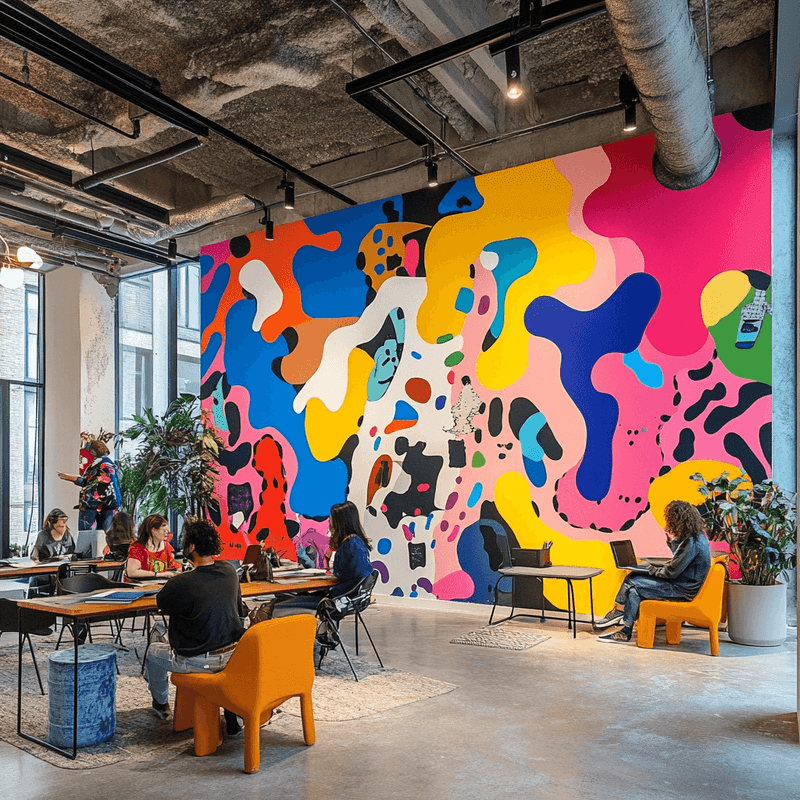
Coworking is still too often seen as the preserve of start-ups and freelancers. These stubborn prejudices could be holding back its adoption in the professional world, so rooted are they in the past and the 2000s. And yet, beyond preconceived ideas, coworking spaces continue to grow in popularity, attracting large companies that are willing to revisit this model. These spaces offer flexibility, community and collaborative opportunities that can greatly benefit professionals and businesses alike. It's time to rethink our prejudices about coworking and let ourselves be guided into this ocean of possibilities.
Prejudice n°1: Coworking is chaotic
Some people think of coworking as a chaotic universe of messy, noisy offices. The reality is quite the opposite! Many coworking spaces are carefully designed to offer a balance between a stimulating environment and an atmosphere conducive to concentration.
This outdated perception fails to take into account the remarkable transformation that coworking spaces have undergone over the years. Today, they embody a modern aesthetic and meticulous organization, offering much more than just a shared workplace. The design of spaces and furniture combines functionality and aesthetics.
Coworking spaces also offer open collaboration zones, and increasingly include closed or ready-to-use offices reserved for members of the same company only. These zones are specifically designed to meet the different needs of employees and companies.
Prejudice n°2: Coworking is only for freelancers
It's common to think that coworking spaces are only for freelancers. However, more and more companies and teams are choosing coworking to foster collaboration and creativity, and benefit from greater flexibility in workspace management.
In a recent survey revealed by Revue Futuribles in November 2023, nearly one coworker in two (47%) worked for a company with more than 50 employees. More and more companies, including some large corporations, are integrating coworking into their real estate strategy. These companies often see coworking as a flexible solution that offers benefits such as reduced real estate costs, flexible workspace, the ability to collaborate with other companies and the creation of a dynamic working environment.
Prejudice n°3: Coworking lacks confidentiality
Some fear that coworking spaces compromise the confidentiality of company data. However, these spaces, and modern coworking brands, are highly committed to this, guaranteeing a high level of confidentiality.
They offer Divers solutions, from private offices to closed meeting rooms.
One of the partners in the Formind group, a cybersecurity consulting and integration firm, explains on the Wojo website why he chose coworking, and more specifically the Wojo coworking brand, to set up his business:
" We handle highly confidential data every day, that's the essence of our business. Choosing shared offices naturally raised a number of questions. Wojo provided us with secure, private offices in Issy-Les-Moulineaux and Lyon, with badge access enabling us to track entries, manage access in fine detail and compartmentalize certain areas. We have also implemented IT solutions, such as private wifi and a dematerialized cloud: our confidentiality requirements are perfectly respected. Our employees isolate themselves in a bubble or a meeting room to telephone or exchange ideas. We also enjoy the peace and quiet of Wojo's convivial shared spaces, such as the meeting rooms, bar or coworking space when we need to work in peace and quiet. "
Another enlightening initiative comes from coworking brand Regus: " At Regus, we take care to separate all our customer connections (...) We use our network firewalls to create virtual private networks. These networks ensure that customers cannot access each other's networks. Everyone's data is isolated from everyone else's. "
Prejudice #4: Coworking is too expensive
In reality, the costs associated with coworking can be more advantageous than traditional office rental, especially given the services included such as maintenance, equipment, and networking events.
Companies can significantly reduce their real estate costs by opting for coworking. Rather than signing long-term leases for traditional office space, coworking offers flexible options with often all-inclusive rates, covering all utilities, maintenance, and other amenities.
Coworking spaces also offer companies great financial flexibility . They can choose plans tailored to their specific needs, whether in terms of number of workstations, length of commitment, or expansion options. This enables them to better manage their budgets and adjust their space requirements as their workforce grows.
Prejudice n°5: Coworking is conducive to distraction
Some people think that coworking is synonymous with constant distractions. However, coworking spaces often offer areas dedicated to quiet working, allowing everyone to choose the environment that suits their concentration needs.
So, despite persistent preconceptions, coworking has evolved far beyond its initial reputation. The concept, once associated with images of chaotic offices and freelancers, has emerged as a versatile and innovative solution for a wide range of businesses. Coworking spaces offer environments that meet the varied needs of modern workers, whether they're looking for dynamic collaboration or quiet concentration.
It's time to set aside outdated prejudices and recognize coworking for what it really is: a strategic response to the changing needs of the professional world. Companies large and small can find financial flexibility, operational adaptability and access to dynamic professional networks in coworking.
Let's celebrate the reality of coworking and dare to accept that thefuture of work is constantly evolving and full of promise.
-
How do companies assert their identity in a shared space?

12/05/2025 How do companies assert their identity in a shared space?
Coworking spaces are places designed for the collective: so how can a company assert its own identity? While flexible space brands strive to be recognizable and identifiable among a thousand, they also enable their occupants to make their own workspaces their own.
-
Coworking: how to create, open and run a shared workplace?

03/05/2025 Coworking: how to create, open and run a shared workplace?
Coworking spaces are springing up all over France. How do they emerge today, and what room is left for new entrants to the flexible workspace market?
-
Coworking: how to prepare employees for flexible working?

03/04/2025 Coworking: how to prepare employees for flexible working?
As coworking spaces win over more and more employees, how can companies support this shift towards greater flexibility, without losing cohesion or performance? Here are a few tips!